Contemporary Issue for Business and Society
VerifiedAdded on 2023/04/22
|15
|4246
|409
AI Summary
This study focuses on the responsibility of management in conducting internal audit to manage and control different aspects of business effectively. It discusses the role of internal control, internal audit in corporate governance, and compliance with UN Global Compact principles related to human rights, labour, environment, and anti-corruption. The case of Nokian Tyres plc, a global compact active firm in Finland, is used as an example.
Contribute Materials
Your contribution can guide someone’s learning journey. Share your
documents today.
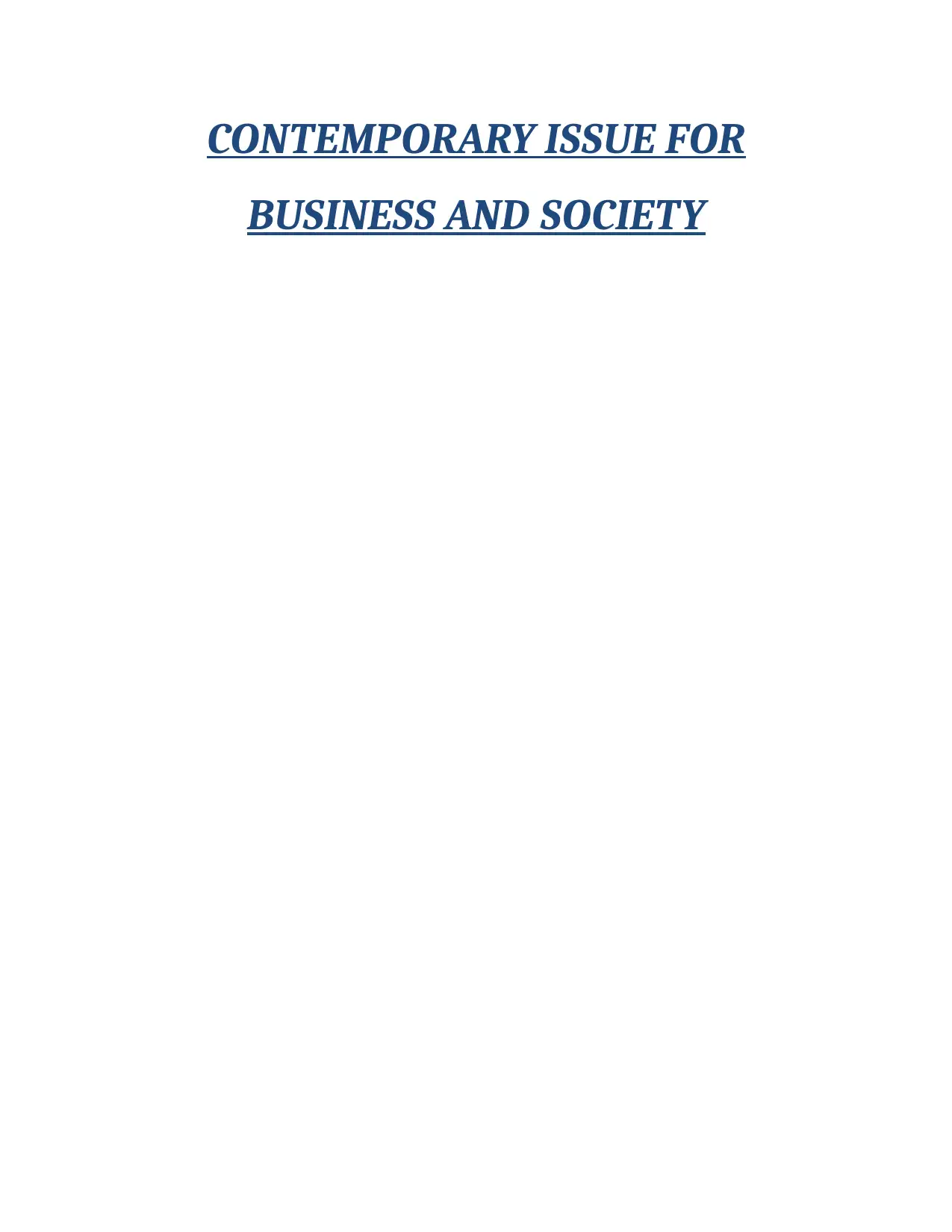
CONTEMPORARY ISSUE FOR
BUSINESS AND SOCIETY
BUSINESS AND SOCIETY
Secure Best Marks with AI Grader
Need help grading? Try our AI Grader for instant feedback on your assignments.
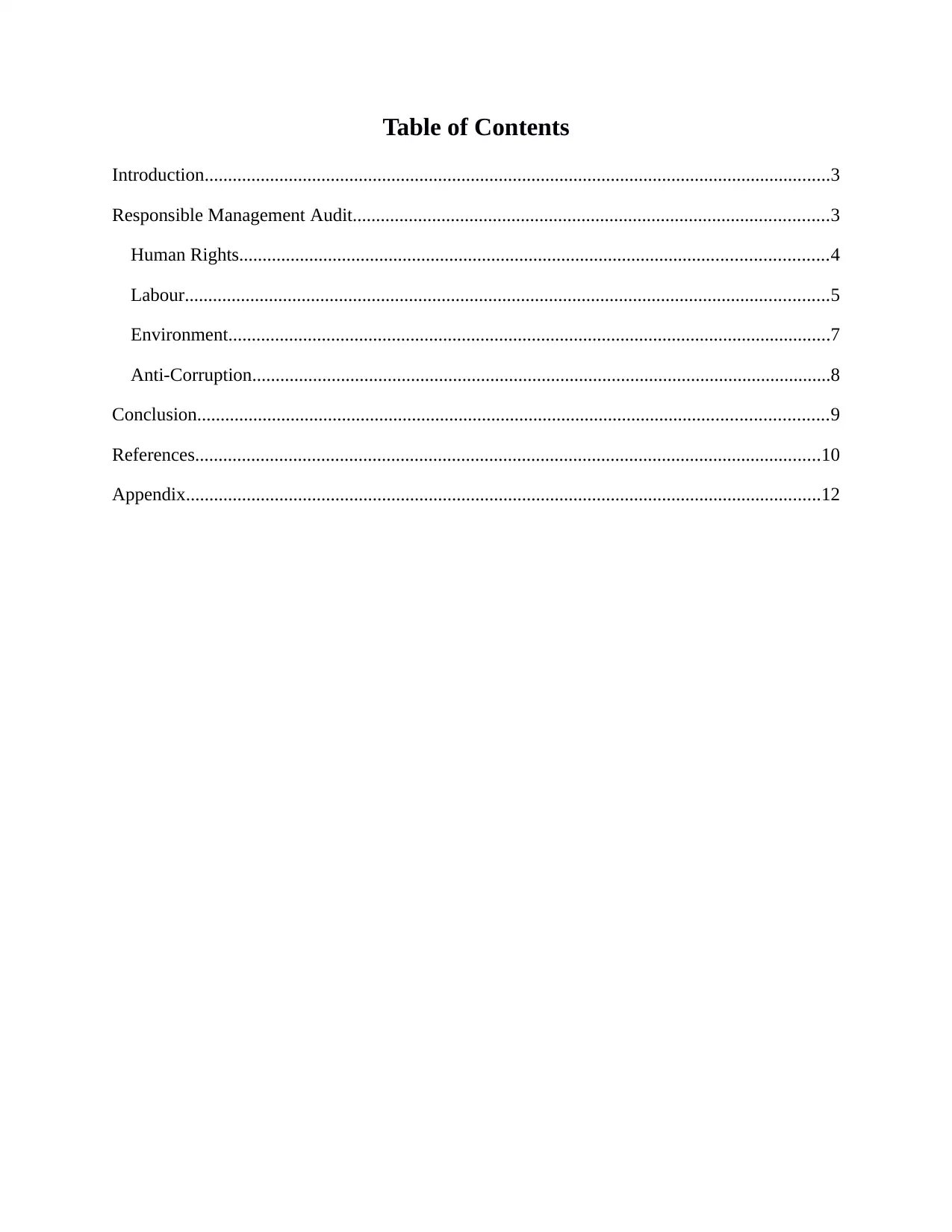
Table of Contents
Introduction......................................................................................................................................3
Responsible Management Audit......................................................................................................3
Human Rights..............................................................................................................................4
Labour..........................................................................................................................................5
Environment.................................................................................................................................7
Anti-Corruption............................................................................................................................8
Conclusion.......................................................................................................................................9
References......................................................................................................................................10
Appendix........................................................................................................................................12
Introduction......................................................................................................................................3
Responsible Management Audit......................................................................................................3
Human Rights..............................................................................................................................4
Labour..........................................................................................................................................5
Environment.................................................................................................................................7
Anti-Corruption............................................................................................................................8
Conclusion.......................................................................................................................................9
References......................................................................................................................................10
Appendix........................................................................................................................................12
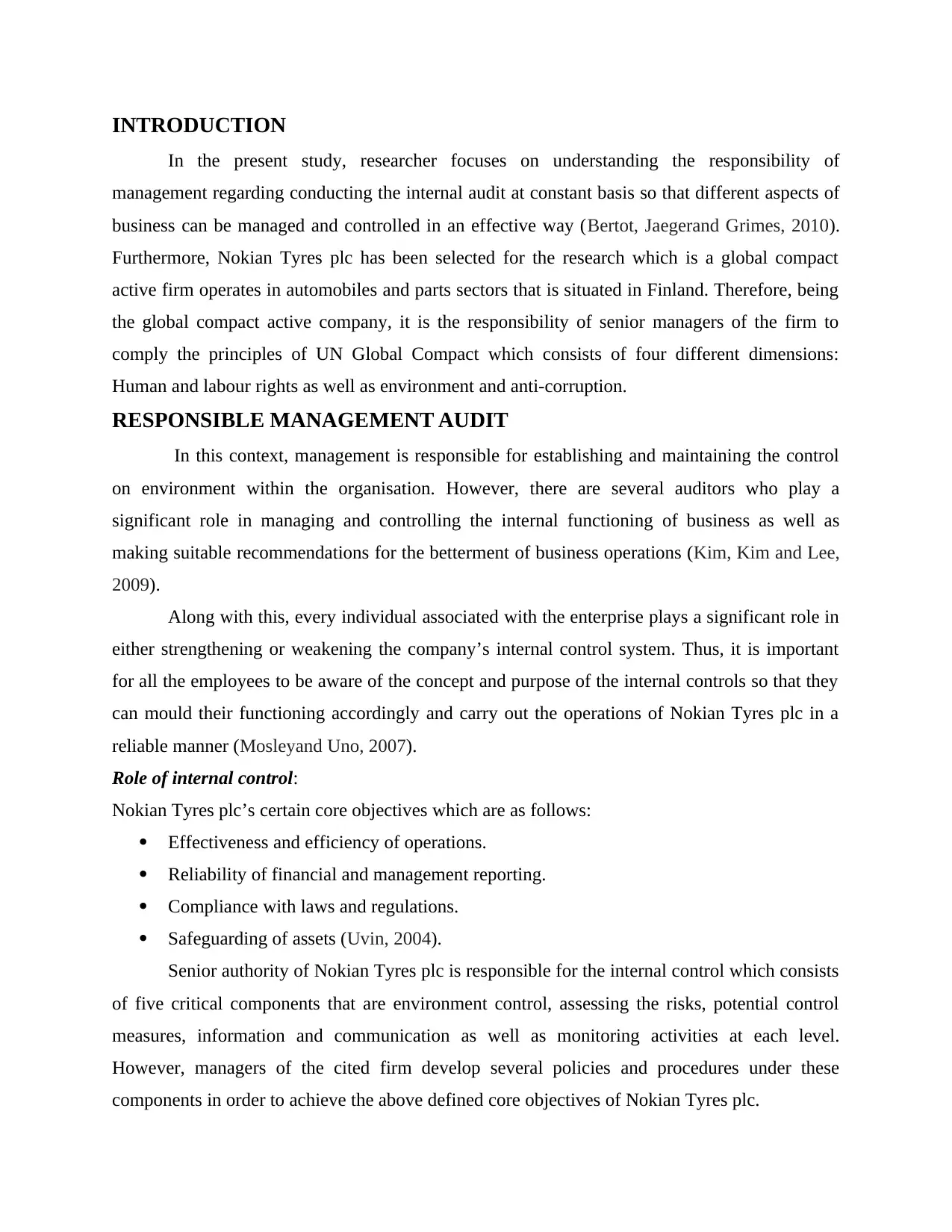
INTRODUCTION
In the present study, researcher focuses on understanding the responsibility of
management regarding conducting the internal audit at constant basis so that different aspects of
business can be managed and controlled in an effective way (Bertot, Jaegerand Grimes, 2010).
Furthermore, Nokian Tyres plc has been selected for the research which is a global compact
active firm operates in automobiles and parts sectors that is situated in Finland. Therefore, being
the global compact active company, it is the responsibility of senior managers of the firm to
comply the principles of UN Global Compact which consists of four different dimensions:
Human and labour rights as well as environment and anti-corruption.
RESPONSIBLE MANAGEMENT AUDIT
In this context, management is responsible for establishing and maintaining the control
on environment within the organisation. However, there are several auditors who play a
significant role in managing and controlling the internal functioning of business as well as
making suitable recommendations for the betterment of business operations (Kim, Kim and Lee,
2009).
Along with this, every individual associated with the enterprise plays a significant role in
either strengthening or weakening the company’s internal control system. Thus, it is important
for all the employees to be aware of the concept and purpose of the internal controls so that they
can mould their functioning accordingly and carry out the operations of Nokian Tyres plc in a
reliable manner (Mosleyand Uno, 2007).
Role of internal control:
Nokian Tyres plc’s certain core objectives which are as follows:
Effectiveness and efficiency of operations.
Reliability of financial and management reporting.
Compliance with laws and regulations.
Safeguarding of assets (Uvin, 2004).
Senior authority of Nokian Tyres plc is responsible for the internal control which consists
of five critical components that are environment control, assessing the risks, potential control
measures, information and communication as well as monitoring activities at each level.
However, managers of the cited firm develop several policies and procedures under these
components in order to achieve the above defined core objectives of Nokian Tyres plc.
In the present study, researcher focuses on understanding the responsibility of
management regarding conducting the internal audit at constant basis so that different aspects of
business can be managed and controlled in an effective way (Bertot, Jaegerand Grimes, 2010).
Furthermore, Nokian Tyres plc has been selected for the research which is a global compact
active firm operates in automobiles and parts sectors that is situated in Finland. Therefore, being
the global compact active company, it is the responsibility of senior managers of the firm to
comply the principles of UN Global Compact which consists of four different dimensions:
Human and labour rights as well as environment and anti-corruption.
RESPONSIBLE MANAGEMENT AUDIT
In this context, management is responsible for establishing and maintaining the control
on environment within the organisation. However, there are several auditors who play a
significant role in managing and controlling the internal functioning of business as well as
making suitable recommendations for the betterment of business operations (Kim, Kim and Lee,
2009).
Along with this, every individual associated with the enterprise plays a significant role in
either strengthening or weakening the company’s internal control system. Thus, it is important
for all the employees to be aware of the concept and purpose of the internal controls so that they
can mould their functioning accordingly and carry out the operations of Nokian Tyres plc in a
reliable manner (Mosleyand Uno, 2007).
Role of internal control:
Nokian Tyres plc’s certain core objectives which are as follows:
Effectiveness and efficiency of operations.
Reliability of financial and management reporting.
Compliance with laws and regulations.
Safeguarding of assets (Uvin, 2004).
Senior authority of Nokian Tyres plc is responsible for the internal control which consists
of five critical components that are environment control, assessing the risks, potential control
measures, information and communication as well as monitoring activities at each level.
However, managers of the cited firm develop several policies and procedures under these
components in order to achieve the above defined core objectives of Nokian Tyres plc.
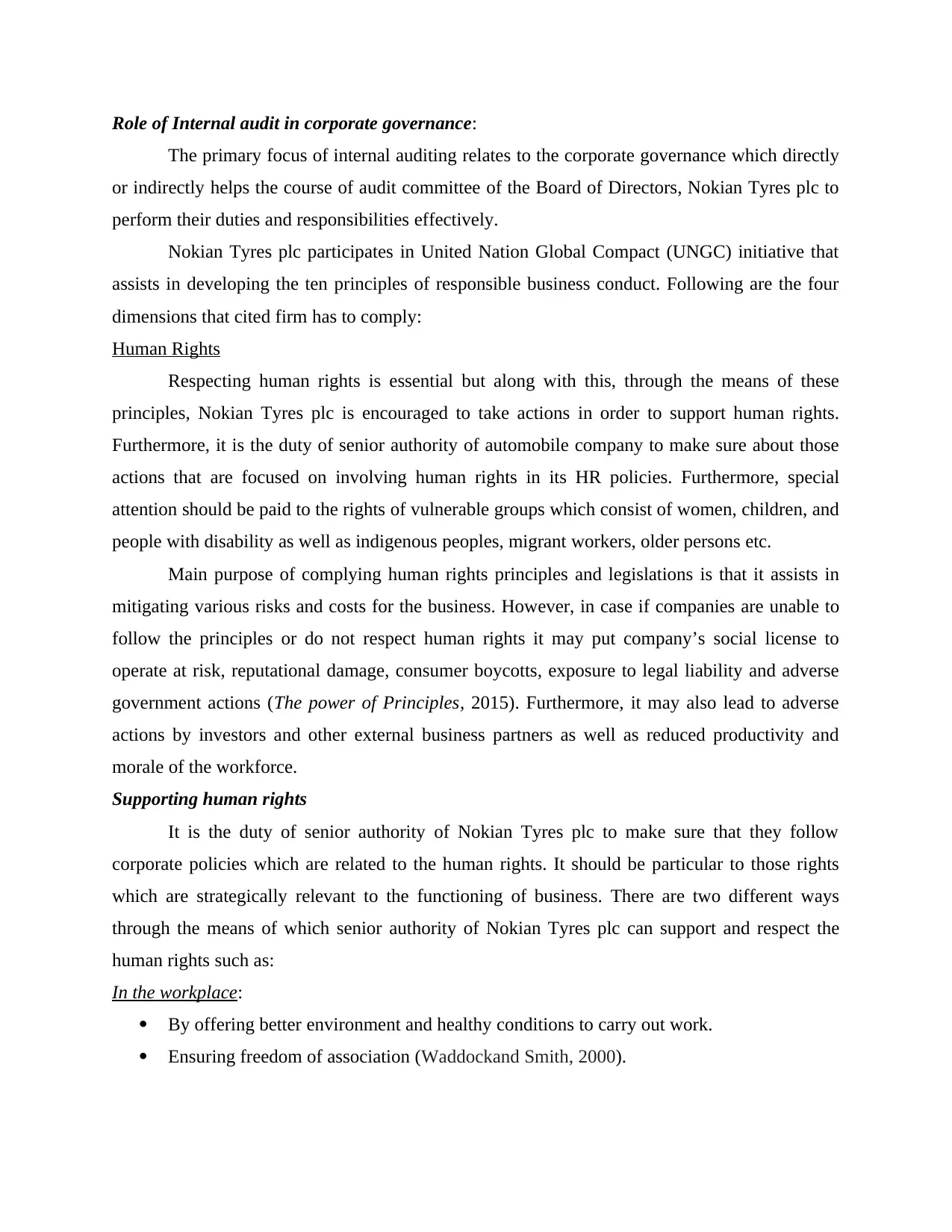
Role of Internal audit in corporate governance:
The primary focus of internal auditing relates to the corporate governance which directly
or indirectly helps the course of audit committee of the Board of Directors, Nokian Tyres plc to
perform their duties and responsibilities effectively.
Nokian Tyres plc participates in United Nation Global Compact (UNGC) initiative that
assists in developing the ten principles of responsible business conduct. Following are the four
dimensions that cited firm has to comply:
Human Rights
Respecting human rights is essential but along with this, through the means of these
principles, Nokian Tyres plc is encouraged to take actions in order to support human rights.
Furthermore, it is the duty of senior authority of automobile company to make sure about those
actions that are focused on involving human rights in its HR policies. Furthermore, special
attention should be paid to the rights of vulnerable groups which consist of women, children, and
people with disability as well as indigenous peoples, migrant workers, older persons etc.
Main purpose of complying human rights principles and legislations is that it assists in
mitigating various risks and costs for the business. However, in case if companies are unable to
follow the principles or do not respect human rights it may put company’s social license to
operate at risk, reputational damage, consumer boycotts, exposure to legal liability and adverse
government actions (The power of Principles, 2015). Furthermore, it may also lead to adverse
actions by investors and other external business partners as well as reduced productivity and
morale of the workforce.
Supporting human rights
It is the duty of senior authority of Nokian Tyres plc to make sure that they follow
corporate policies which are related to the human rights. It should be particular to those rights
which are strategically relevant to the functioning of business. There are two different ways
through the means of which senior authority of Nokian Tyres plc can support and respect the
human rights such as:
In the workplace:
By offering better environment and healthy conditions to carry out work.
Ensuring freedom of association (Waddockand Smith, 2000).
The primary focus of internal auditing relates to the corporate governance which directly
or indirectly helps the course of audit committee of the Board of Directors, Nokian Tyres plc to
perform their duties and responsibilities effectively.
Nokian Tyres plc participates in United Nation Global Compact (UNGC) initiative that
assists in developing the ten principles of responsible business conduct. Following are the four
dimensions that cited firm has to comply:
Human Rights
Respecting human rights is essential but along with this, through the means of these
principles, Nokian Tyres plc is encouraged to take actions in order to support human rights.
Furthermore, it is the duty of senior authority of automobile company to make sure about those
actions that are focused on involving human rights in its HR policies. Furthermore, special
attention should be paid to the rights of vulnerable groups which consist of women, children, and
people with disability as well as indigenous peoples, migrant workers, older persons etc.
Main purpose of complying human rights principles and legislations is that it assists in
mitigating various risks and costs for the business. However, in case if companies are unable to
follow the principles or do not respect human rights it may put company’s social license to
operate at risk, reputational damage, consumer boycotts, exposure to legal liability and adverse
government actions (The power of Principles, 2015). Furthermore, it may also lead to adverse
actions by investors and other external business partners as well as reduced productivity and
morale of the workforce.
Supporting human rights
It is the duty of senior authority of Nokian Tyres plc to make sure that they follow
corporate policies which are related to the human rights. It should be particular to those rights
which are strategically relevant to the functioning of business. There are two different ways
through the means of which senior authority of Nokian Tyres plc can support and respect the
human rights such as:
In the workplace:
By offering better environment and healthy conditions to carry out work.
Ensuring freedom of association (Waddockand Smith, 2000).
Secure Best Marks with AI Grader
Need help grading? Try our AI Grader for instant feedback on your assignments.
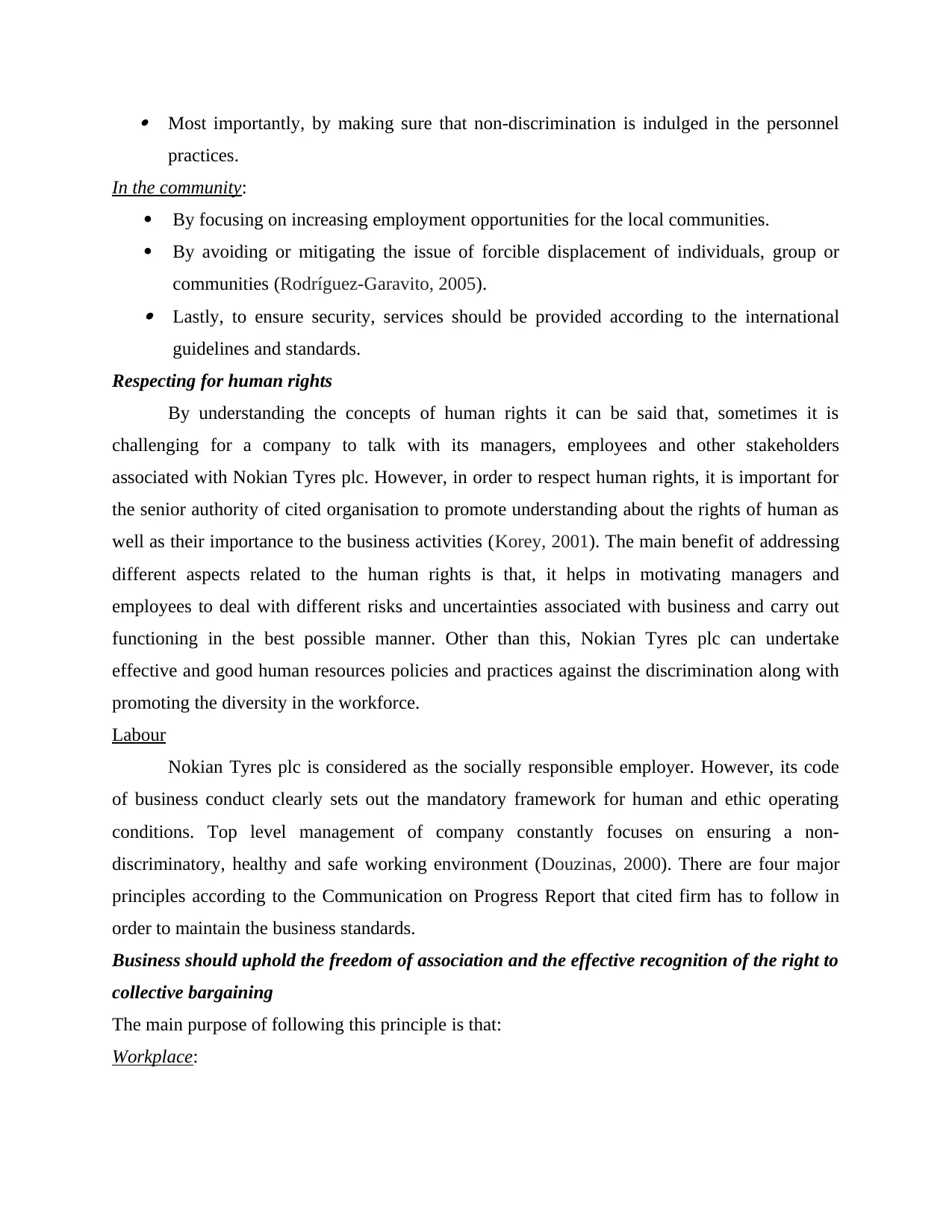
Most importantly, by making sure that non-discrimination is indulged in the personnel
practices.
In the community:
By focusing on increasing employment opportunities for the local communities.
By avoiding or mitigating the issue of forcible displacement of individuals, group or
communities (Rodríguez-Garavito, 2005). Lastly, to ensure security, services should be provided according to the international
guidelines and standards.
Respecting for human rights
By understanding the concepts of human rights it can be said that, sometimes it is
challenging for a company to talk with its managers, employees and other stakeholders
associated with Nokian Tyres plc. However, in order to respect human rights, it is important for
the senior authority of cited organisation to promote understanding about the rights of human as
well as their importance to the business activities (Korey, 2001). The main benefit of addressing
different aspects related to the human rights is that, it helps in motivating managers and
employees to deal with different risks and uncertainties associated with business and carry out
functioning in the best possible manner. Other than this, Nokian Tyres plc can undertake
effective and good human resources policies and practices against the discrimination along with
promoting the diversity in the workforce.
Labour
Nokian Tyres plc is considered as the socially responsible employer. However, its code
of business conduct clearly sets out the mandatory framework for human and ethic operating
conditions. Top level management of company constantly focuses on ensuring a non-
discriminatory, healthy and safe working environment (Douzinas, 2000). There are four major
principles according to the Communication on Progress Report that cited firm has to follow in
order to maintain the business standards.
Business should uphold the freedom of association and the effective recognition of the right to
collective bargaining
The main purpose of following this principle is that:
Workplace:
practices.
In the community:
By focusing on increasing employment opportunities for the local communities.
By avoiding or mitigating the issue of forcible displacement of individuals, group or
communities (Rodríguez-Garavito, 2005). Lastly, to ensure security, services should be provided according to the international
guidelines and standards.
Respecting for human rights
By understanding the concepts of human rights it can be said that, sometimes it is
challenging for a company to talk with its managers, employees and other stakeholders
associated with Nokian Tyres plc. However, in order to respect human rights, it is important for
the senior authority of cited organisation to promote understanding about the rights of human as
well as their importance to the business activities (Korey, 2001). The main benefit of addressing
different aspects related to the human rights is that, it helps in motivating managers and
employees to deal with different risks and uncertainties associated with business and carry out
functioning in the best possible manner. Other than this, Nokian Tyres plc can undertake
effective and good human resources policies and practices against the discrimination along with
promoting the diversity in the workforce.
Labour
Nokian Tyres plc is considered as the socially responsible employer. However, its code
of business conduct clearly sets out the mandatory framework for human and ethic operating
conditions. Top level management of company constantly focuses on ensuring a non-
discriminatory, healthy and safe working environment (Douzinas, 2000). There are four major
principles according to the Communication on Progress Report that cited firm has to follow in
order to maintain the business standards.
Business should uphold the freedom of association and the effective recognition of the right to
collective bargaining
The main purpose of following this principle is that:
Workplace:
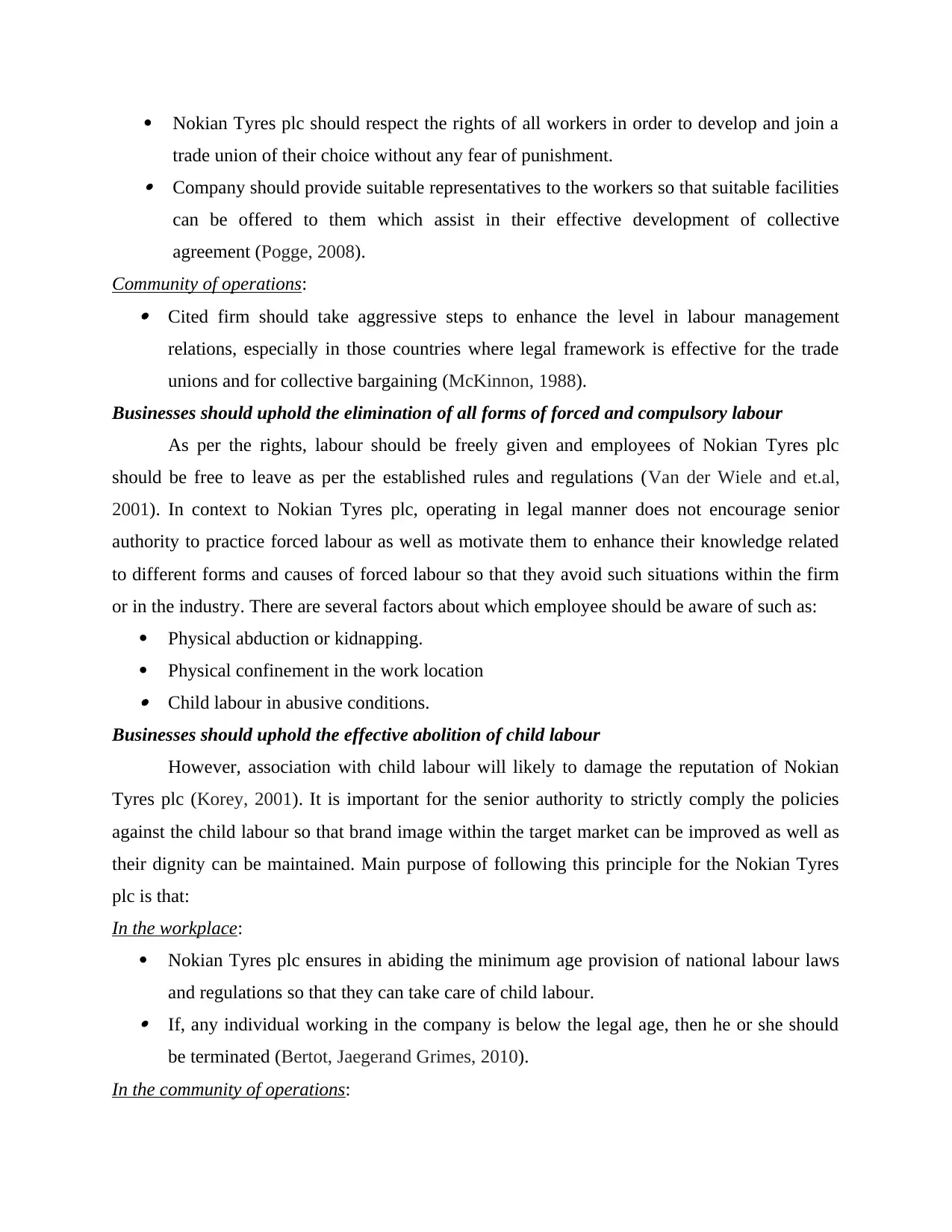
Nokian Tyres plc should respect the rights of all workers in order to develop and join a
trade union of their choice without any fear of punishment. Company should provide suitable representatives to the workers so that suitable facilities
can be offered to them which assist in their effective development of collective
agreement (Pogge, 2008).
Community of operations: Cited firm should take aggressive steps to enhance the level in labour management
relations, especially in those countries where legal framework is effective for the trade
unions and for collective bargaining (McKinnon, 1988).
Businesses should uphold the elimination of all forms of forced and compulsory labour
As per the rights, labour should be freely given and employees of Nokian Tyres plc
should be free to leave as per the established rules and regulations (Van der Wiele and et.al,
2001). In context to Nokian Tyres plc, operating in legal manner does not encourage senior
authority to practice forced labour as well as motivate them to enhance their knowledge related
to different forms and causes of forced labour so that they avoid such situations within the firm
or in the industry. There are several factors about which employee should be aware of such as:
Physical abduction or kidnapping.
Physical confinement in the work location Child labour in abusive conditions.
Businesses should uphold the effective abolition of child labour
However, association with child labour will likely to damage the reputation of Nokian
Tyres plc (Korey, 2001). It is important for the senior authority to strictly comply the policies
against the child labour so that brand image within the target market can be improved as well as
their dignity can be maintained. Main purpose of following this principle for the Nokian Tyres
plc is that:
In the workplace:
Nokian Tyres plc ensures in abiding the minimum age provision of national labour laws
and regulations so that they can take care of child labour. If, any individual working in the company is below the legal age, then he or she should
be terminated (Bertot, Jaegerand Grimes, 2010).
In the community of operations:
trade union of their choice without any fear of punishment. Company should provide suitable representatives to the workers so that suitable facilities
can be offered to them which assist in their effective development of collective
agreement (Pogge, 2008).
Community of operations: Cited firm should take aggressive steps to enhance the level in labour management
relations, especially in those countries where legal framework is effective for the trade
unions and for collective bargaining (McKinnon, 1988).
Businesses should uphold the elimination of all forms of forced and compulsory labour
As per the rights, labour should be freely given and employees of Nokian Tyres plc
should be free to leave as per the established rules and regulations (Van der Wiele and et.al,
2001). In context to Nokian Tyres plc, operating in legal manner does not encourage senior
authority to practice forced labour as well as motivate them to enhance their knowledge related
to different forms and causes of forced labour so that they avoid such situations within the firm
or in the industry. There are several factors about which employee should be aware of such as:
Physical abduction or kidnapping.
Physical confinement in the work location Child labour in abusive conditions.
Businesses should uphold the effective abolition of child labour
However, association with child labour will likely to damage the reputation of Nokian
Tyres plc (Korey, 2001). It is important for the senior authority to strictly comply the policies
against the child labour so that brand image within the target market can be improved as well as
their dignity can be maintained. Main purpose of following this principle for the Nokian Tyres
plc is that:
In the workplace:
Nokian Tyres plc ensures in abiding the minimum age provision of national labour laws
and regulations so that they can take care of child labour. If, any individual working in the company is below the legal age, then he or she should
be terminated (Bertot, Jaegerand Grimes, 2010).
In the community of operations:
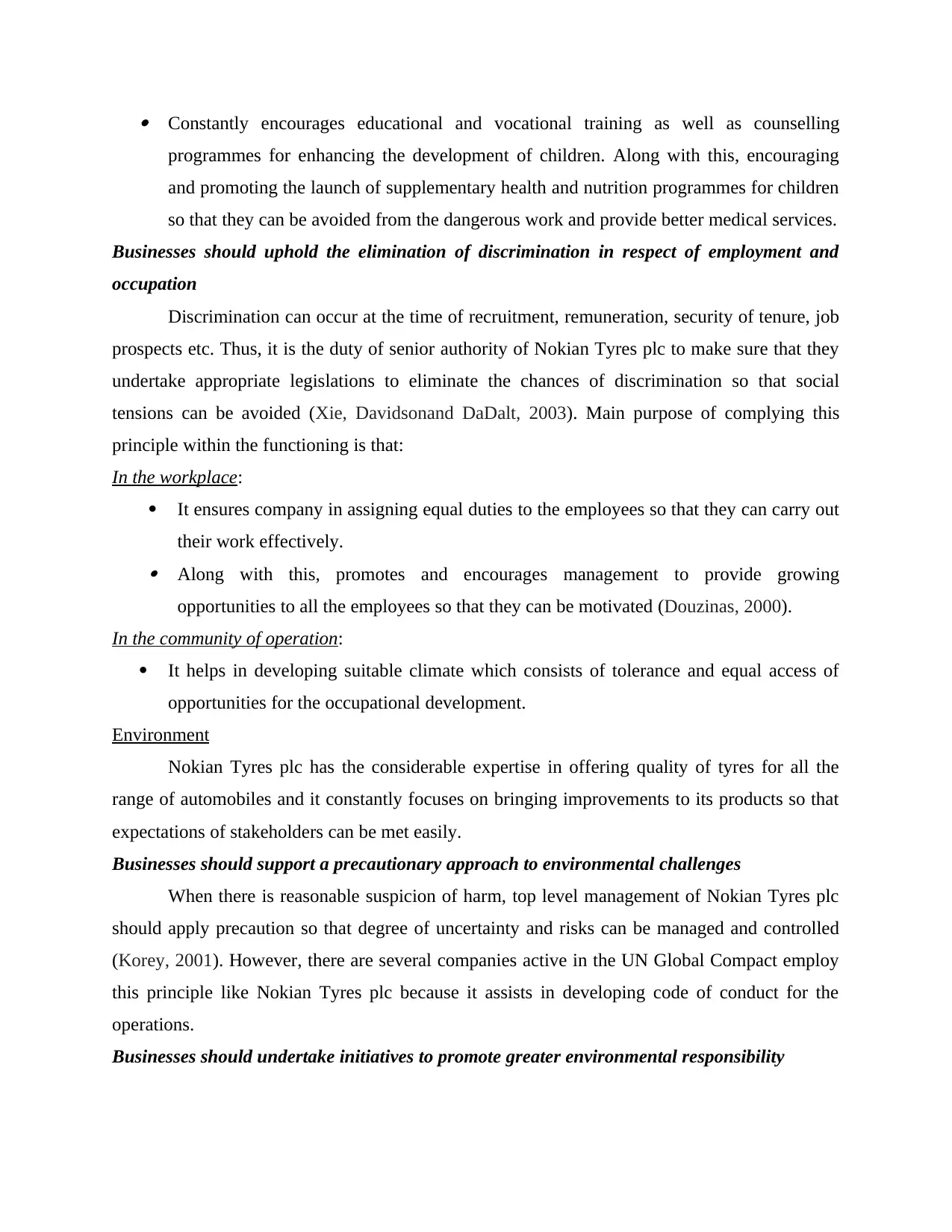
Constantly encourages educational and vocational training as well as counselling
programmes for enhancing the development of children. Along with this, encouraging
and promoting the launch of supplementary health and nutrition programmes for children
so that they can be avoided from the dangerous work and provide better medical services.
Businesses should uphold the elimination of discrimination in respect of employment and
occupation
Discrimination can occur at the time of recruitment, remuneration, security of tenure, job
prospects etc. Thus, it is the duty of senior authority of Nokian Tyres plc to make sure that they
undertake appropriate legislations to eliminate the chances of discrimination so that social
tensions can be avoided (Xie, Davidsonand DaDalt, 2003). Main purpose of complying this
principle within the functioning is that:
In the workplace:
It ensures company in assigning equal duties to the employees so that they can carry out
their work effectively. Along with this, promotes and encourages management to provide growing
opportunities to all the employees so that they can be motivated (Douzinas, 2000).
In the community of operation:
It helps in developing suitable climate which consists of tolerance and equal access of
opportunities for the occupational development.
Environment
Nokian Tyres plc has the considerable expertise in offering quality of tyres for all the
range of automobiles and it constantly focuses on bringing improvements to its products so that
expectations of stakeholders can be met easily.
Businesses should support a precautionary approach to environmental challenges
When there is reasonable suspicion of harm, top level management of Nokian Tyres plc
should apply precaution so that degree of uncertainty and risks can be managed and controlled
(Korey, 2001). However, there are several companies active in the UN Global Compact employ
this principle like Nokian Tyres plc because it assists in developing code of conduct for the
operations.
Businesses should undertake initiatives to promote greater environmental responsibility
programmes for enhancing the development of children. Along with this, encouraging
and promoting the launch of supplementary health and nutrition programmes for children
so that they can be avoided from the dangerous work and provide better medical services.
Businesses should uphold the elimination of discrimination in respect of employment and
occupation
Discrimination can occur at the time of recruitment, remuneration, security of tenure, job
prospects etc. Thus, it is the duty of senior authority of Nokian Tyres plc to make sure that they
undertake appropriate legislations to eliminate the chances of discrimination so that social
tensions can be avoided (Xie, Davidsonand DaDalt, 2003). Main purpose of complying this
principle within the functioning is that:
In the workplace:
It ensures company in assigning equal duties to the employees so that they can carry out
their work effectively. Along with this, promotes and encourages management to provide growing
opportunities to all the employees so that they can be motivated (Douzinas, 2000).
In the community of operation:
It helps in developing suitable climate which consists of tolerance and equal access of
opportunities for the occupational development.
Environment
Nokian Tyres plc has the considerable expertise in offering quality of tyres for all the
range of automobiles and it constantly focuses on bringing improvements to its products so that
expectations of stakeholders can be met easily.
Businesses should support a precautionary approach to environmental challenges
When there is reasonable suspicion of harm, top level management of Nokian Tyres plc
should apply precaution so that degree of uncertainty and risks can be managed and controlled
(Korey, 2001). However, there are several companies active in the UN Global Compact employ
this principle like Nokian Tyres plc because it assists in developing code of conduct for the
operations.
Businesses should undertake initiatives to promote greater environmental responsibility
Paraphrase This Document
Need a fresh take? Get an instant paraphrase of this document with our AI Paraphraser
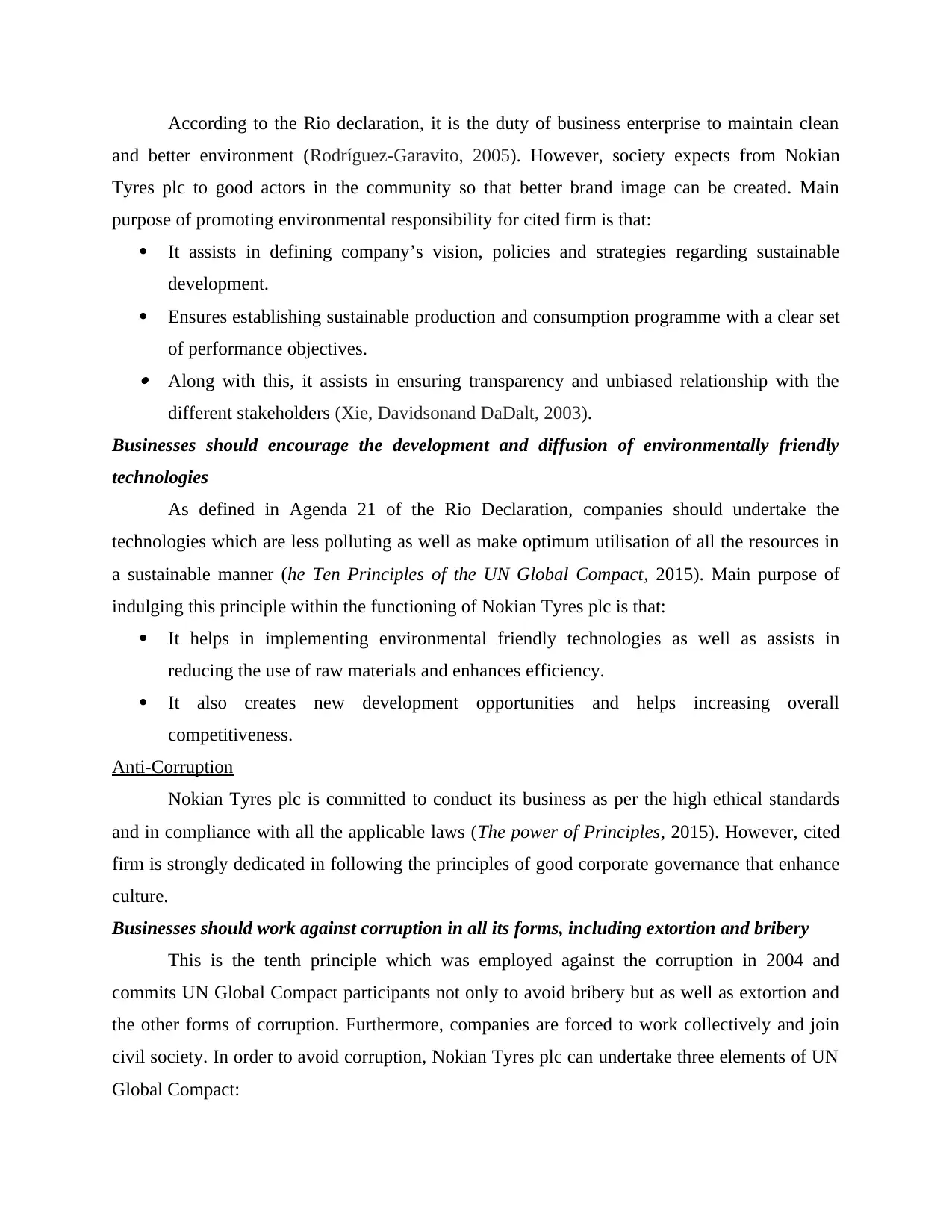
According to the Rio declaration, it is the duty of business enterprise to maintain clean
and better environment (Rodríguez-Garavito, 2005). However, society expects from Nokian
Tyres plc to good actors in the community so that better brand image can be created. Main
purpose of promoting environmental responsibility for cited firm is that:
It assists in defining company’s vision, policies and strategies regarding sustainable
development.
Ensures establishing sustainable production and consumption programme with a clear set
of performance objectives. Along with this, it assists in ensuring transparency and unbiased relationship with the
different stakeholders (Xie, Davidsonand DaDalt, 2003).
Businesses should encourage the development and diffusion of environmentally friendly
technologies
As defined in Agenda 21 of the Rio Declaration, companies should undertake the
technologies which are less polluting as well as make optimum utilisation of all the resources in
a sustainable manner (he Ten Principles of the UN Global Compact, 2015). Main purpose of
indulging this principle within the functioning of Nokian Tyres plc is that:
It helps in implementing environmental friendly technologies as well as assists in
reducing the use of raw materials and enhances efficiency.
It also creates new development opportunities and helps increasing overall
competitiveness.
Anti-Corruption
Nokian Tyres plc is committed to conduct its business as per the high ethical standards
and in compliance with all the applicable laws (The power of Principles, 2015). However, cited
firm is strongly dedicated in following the principles of good corporate governance that enhance
culture.
Businesses should work against corruption in all its forms, including extortion and bribery
This is the tenth principle which was employed against the corruption in 2004 and
commits UN Global Compact participants not only to avoid bribery but as well as extortion and
the other forms of corruption. Furthermore, companies are forced to work collectively and join
civil society. In order to avoid corruption, Nokian Tyres plc can undertake three elements of UN
Global Compact:
and better environment (Rodríguez-Garavito, 2005). However, society expects from Nokian
Tyres plc to good actors in the community so that better brand image can be created. Main
purpose of promoting environmental responsibility for cited firm is that:
It assists in defining company’s vision, policies and strategies regarding sustainable
development.
Ensures establishing sustainable production and consumption programme with a clear set
of performance objectives. Along with this, it assists in ensuring transparency and unbiased relationship with the
different stakeholders (Xie, Davidsonand DaDalt, 2003).
Businesses should encourage the development and diffusion of environmentally friendly
technologies
As defined in Agenda 21 of the Rio Declaration, companies should undertake the
technologies which are less polluting as well as make optimum utilisation of all the resources in
a sustainable manner (he Ten Principles of the UN Global Compact, 2015). Main purpose of
indulging this principle within the functioning of Nokian Tyres plc is that:
It helps in implementing environmental friendly technologies as well as assists in
reducing the use of raw materials and enhances efficiency.
It also creates new development opportunities and helps increasing overall
competitiveness.
Anti-Corruption
Nokian Tyres plc is committed to conduct its business as per the high ethical standards
and in compliance with all the applicable laws (The power of Principles, 2015). However, cited
firm is strongly dedicated in following the principles of good corporate governance that enhance
culture.
Businesses should work against corruption in all its forms, including extortion and bribery
This is the tenth principle which was employed against the corruption in 2004 and
commits UN Global Compact participants not only to avoid bribery but as well as extortion and
the other forms of corruption. Furthermore, companies are forced to work collectively and join
civil society. In order to avoid corruption, Nokian Tyres plc can undertake three elements of UN
Global Compact:
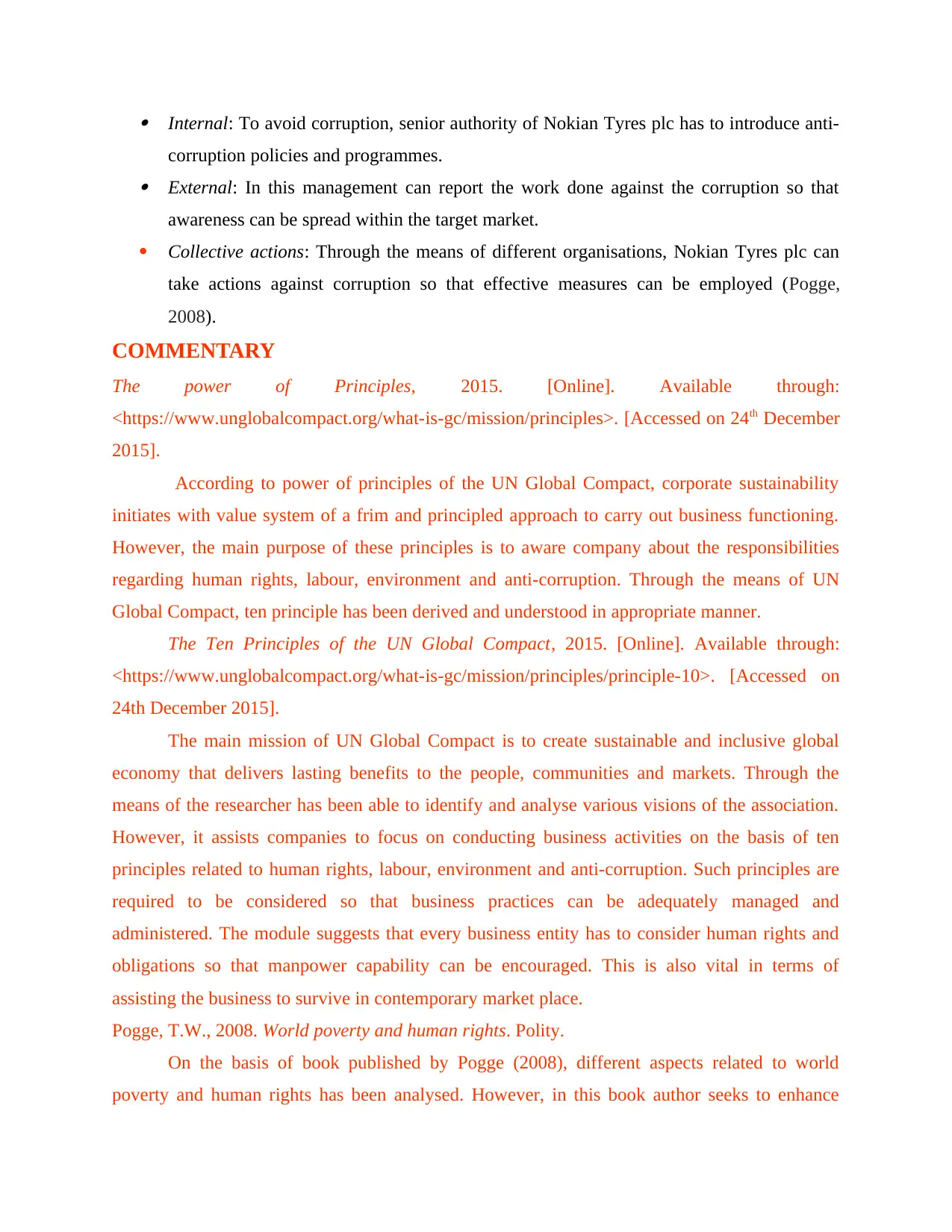
Internal: To avoid corruption, senior authority of Nokian Tyres plc has to introduce anti-
corruption policies and programmes. External: In this management can report the work done against the corruption so that
awareness can be spread within the target market.
Collective actions: Through the means of different organisations, Nokian Tyres plc can
take actions against corruption so that effective measures can be employed (Pogge,
2008).
COMMENTARY
The power of Principles, 2015. [Online]. Available through:
<https://www.unglobalcompact.org/what-is-gc/mission/principles>. [Accessed on 24th December
2015].
According to power of principles of the UN Global Compact, corporate sustainability
initiates with value system of a frim and principled approach to carry out business functioning.
However, the main purpose of these principles is to aware company about the responsibilities
regarding human rights, labour, environment and anti-corruption. Through the means of UN
Global Compact, ten principle has been derived and understood in appropriate manner.
The Ten Principles of the UN Global Compact, 2015. [Online]. Available through:
<https://www.unglobalcompact.org/what-is-gc/mission/principles/principle-10>. [Accessed on
24th December 2015].
The main mission of UN Global Compact is to create sustainable and inclusive global
economy that delivers lasting benefits to the people, communities and markets. Through the
means of the researcher has been able to identify and analyse various visions of the association.
However, it assists companies to focus on conducting business activities on the basis of ten
principles related to human rights, labour, environment and anti-corruption. Such principles are
required to be considered so that business practices can be adequately managed and
administered. The module suggests that every business entity has to consider human rights and
obligations so that manpower capability can be encouraged. This is also vital in terms of
assisting the business to survive in contemporary market place.
Pogge, T.W., 2008. World poverty and human rights. Polity.
On the basis of book published by Pogge (2008), different aspects related to world
poverty and human rights has been analysed. However, in this book author seeks to enhance
corruption policies and programmes. External: In this management can report the work done against the corruption so that
awareness can be spread within the target market.
Collective actions: Through the means of different organisations, Nokian Tyres plc can
take actions against corruption so that effective measures can be employed (Pogge,
2008).
COMMENTARY
The power of Principles, 2015. [Online]. Available through:
<https://www.unglobalcompact.org/what-is-gc/mission/principles>. [Accessed on 24th December
2015].
According to power of principles of the UN Global Compact, corporate sustainability
initiates with value system of a frim and principled approach to carry out business functioning.
However, the main purpose of these principles is to aware company about the responsibilities
regarding human rights, labour, environment and anti-corruption. Through the means of UN
Global Compact, ten principle has been derived and understood in appropriate manner.
The Ten Principles of the UN Global Compact, 2015. [Online]. Available through:
<https://www.unglobalcompact.org/what-is-gc/mission/principles/principle-10>. [Accessed on
24th December 2015].
The main mission of UN Global Compact is to create sustainable and inclusive global
economy that delivers lasting benefits to the people, communities and markets. Through the
means of the researcher has been able to identify and analyse various visions of the association.
However, it assists companies to focus on conducting business activities on the basis of ten
principles related to human rights, labour, environment and anti-corruption. Such principles are
required to be considered so that business practices can be adequately managed and
administered. The module suggests that every business entity has to consider human rights and
obligations so that manpower capability can be encouraged. This is also vital in terms of
assisting the business to survive in contemporary market place.
Pogge, T.W., 2008. World poverty and human rights. Polity.
On the basis of book published by Pogge (2008), different aspects related to world
poverty and human rights has been analysed. However, in this book author seeks to enhance
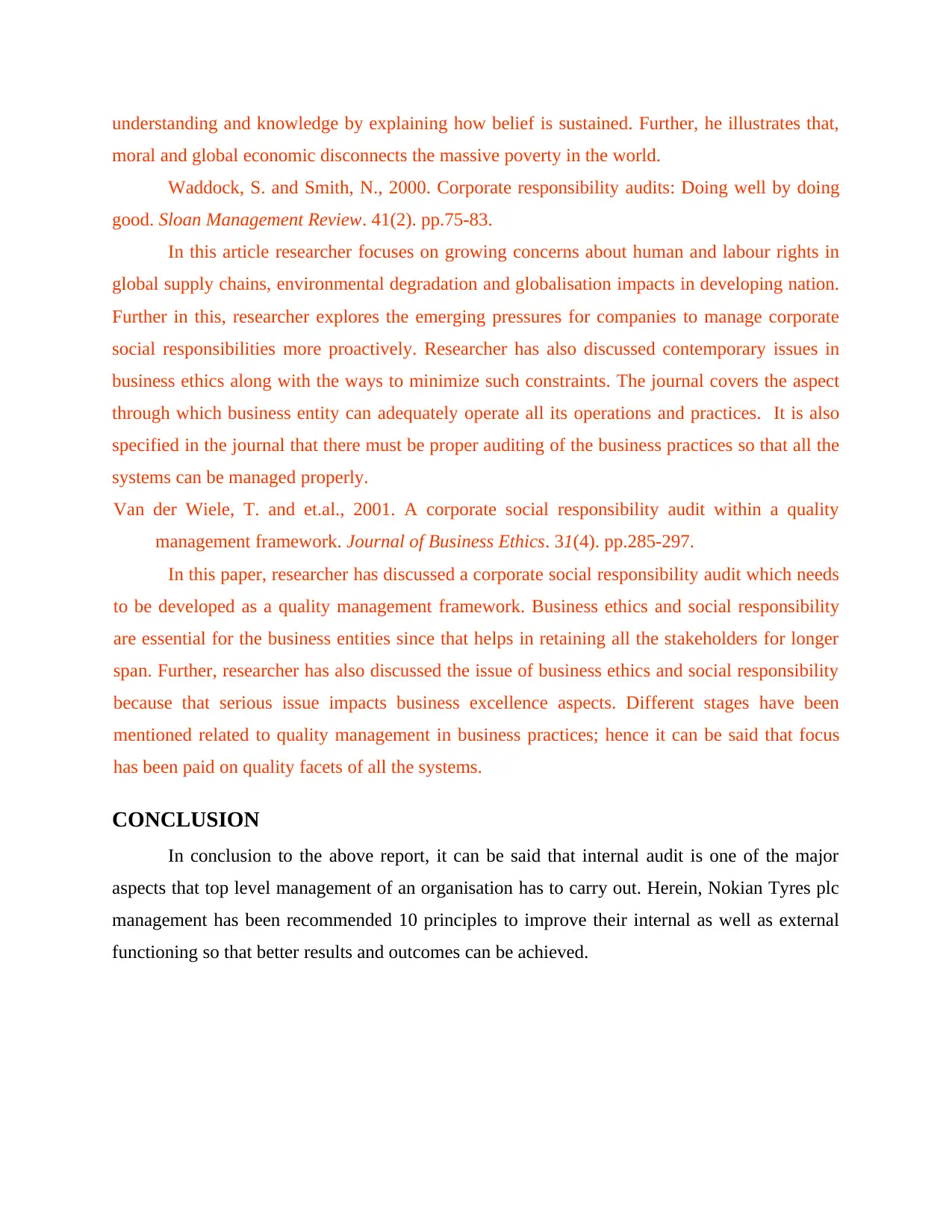
understanding and knowledge by explaining how belief is sustained. Further, he illustrates that,
moral and global economic disconnects the massive poverty in the world.
Waddock, S. and Smith, N., 2000. Corporate responsibility audits: Doing well by doing
good. Sloan Management Review. 41(2). pp.75-83.
In this article researcher focuses on growing concerns about human and labour rights in
global supply chains, environmental degradation and globalisation impacts in developing nation.
Further in this, researcher explores the emerging pressures for companies to manage corporate
social responsibilities more proactively. Researcher has also discussed contemporary issues in
business ethics along with the ways to minimize such constraints. The journal covers the aspect
through which business entity can adequately operate all its operations and practices. It is also
specified in the journal that there must be proper auditing of the business practices so that all the
systems can be managed properly.
Van der Wiele, T. and et.al., 2001. A corporate social responsibility audit within a quality
management framework. Journal of Business Ethics. 31(4). pp.285-297.
In this paper, researcher has discussed a corporate social responsibility audit which needs
to be developed as a quality management framework. Business ethics and social responsibility
are essential for the business entities since that helps in retaining all the stakeholders for longer
span. Further, researcher has also discussed the issue of business ethics and social responsibility
because that serious issue impacts business excellence aspects. Different stages have been
mentioned related to quality management in business practices; hence it can be said that focus
has been paid on quality facets of all the systems.
CONCLUSION
In conclusion to the above report, it can be said that internal audit is one of the major
aspects that top level management of an organisation has to carry out. Herein, Nokian Tyres plc
management has been recommended 10 principles to improve their internal as well as external
functioning so that better results and outcomes can be achieved.
moral and global economic disconnects the massive poverty in the world.
Waddock, S. and Smith, N., 2000. Corporate responsibility audits: Doing well by doing
good. Sloan Management Review. 41(2). pp.75-83.
In this article researcher focuses on growing concerns about human and labour rights in
global supply chains, environmental degradation and globalisation impacts in developing nation.
Further in this, researcher explores the emerging pressures for companies to manage corporate
social responsibilities more proactively. Researcher has also discussed contemporary issues in
business ethics along with the ways to minimize such constraints. The journal covers the aspect
through which business entity can adequately operate all its operations and practices. It is also
specified in the journal that there must be proper auditing of the business practices so that all the
systems can be managed properly.
Van der Wiele, T. and et.al., 2001. A corporate social responsibility audit within a quality
management framework. Journal of Business Ethics. 31(4). pp.285-297.
In this paper, researcher has discussed a corporate social responsibility audit which needs
to be developed as a quality management framework. Business ethics and social responsibility
are essential for the business entities since that helps in retaining all the stakeholders for longer
span. Further, researcher has also discussed the issue of business ethics and social responsibility
because that serious issue impacts business excellence aspects. Different stages have been
mentioned related to quality management in business practices; hence it can be said that focus
has been paid on quality facets of all the systems.
CONCLUSION
In conclusion to the above report, it can be said that internal audit is one of the major
aspects that top level management of an organisation has to carry out. Herein, Nokian Tyres plc
management has been recommended 10 principles to improve their internal as well as external
functioning so that better results and outcomes can be achieved.
Secure Best Marks with AI Grader
Need help grading? Try our AI Grader for instant feedback on your assignments.
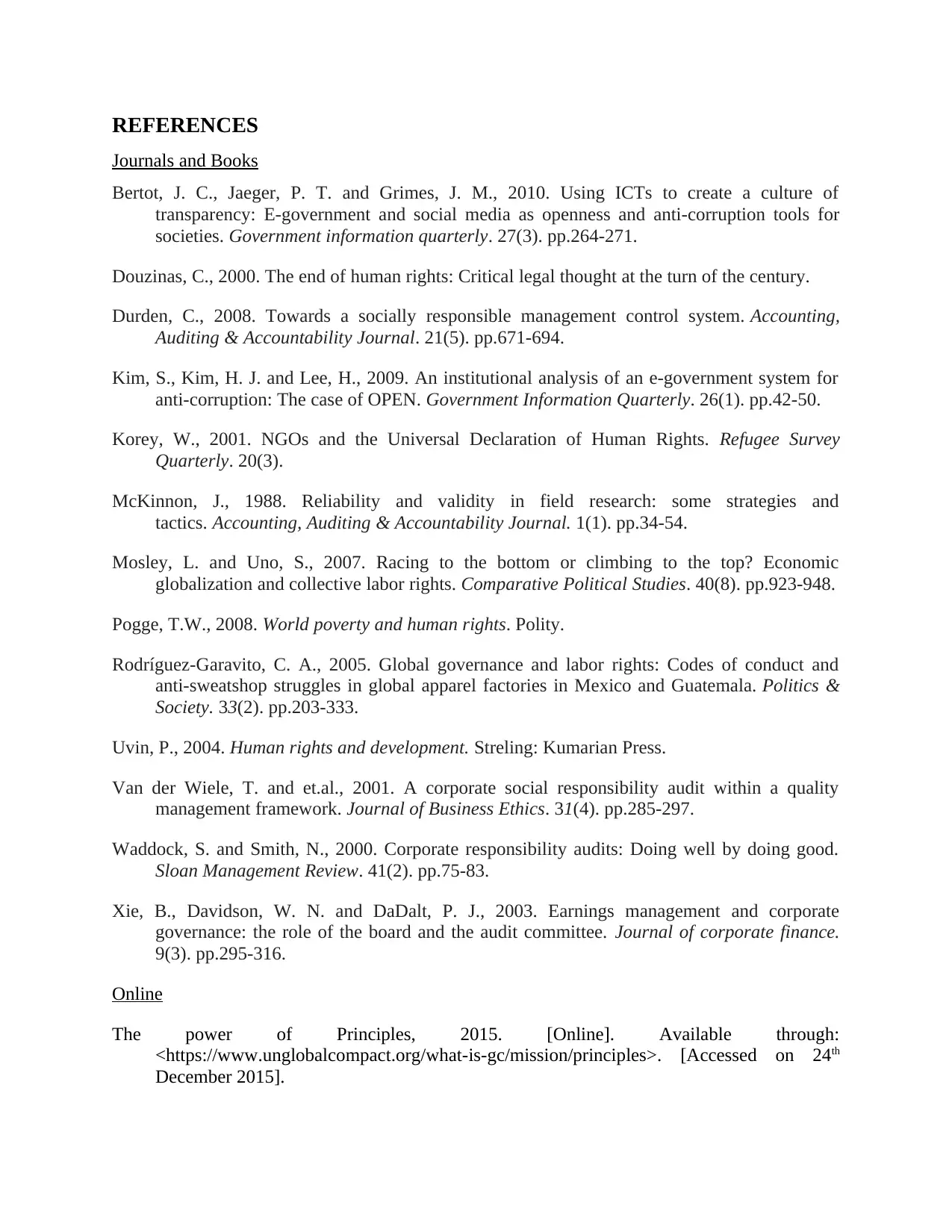
REFERENCES
Journals and Books
Bertot, J. C., Jaeger, P. T. and Grimes, J. M., 2010. Using ICTs to create a culture of
transparency: E-government and social media as openness and anti-corruption tools for
societies. Government information quarterly. 27(3). pp.264-271.
Douzinas, C., 2000. The end of human rights: Critical legal thought at the turn of the century.
Durden, C., 2008. Towards a socially responsible management control system. Accounting,
Auditing & Accountability Journal. 21(5). pp.671-694.
Kim, S., Kim, H. J. and Lee, H., 2009. An institutional analysis of an e-government system for
anti-corruption: The case of OPEN. Government Information Quarterly. 26(1). pp.42-50.
Korey, W., 2001. NGOs and the Universal Declaration of Human Rights. Refugee Survey
Quarterly. 20(3).
McKinnon, J., 1988. Reliability and validity in field research: some strategies and
tactics. Accounting, Auditing & Accountability Journal. 1(1). pp.34-54.
Mosley, L. and Uno, S., 2007. Racing to the bottom or climbing to the top? Economic
globalization and collective labor rights. Comparative Political Studies. 40(8). pp.923-948.
Pogge, T.W., 2008. World poverty and human rights. Polity.
Rodríguez-Garavito, C. A., 2005. Global governance and labor rights: Codes of conduct and
anti-sweatshop struggles in global apparel factories in Mexico and Guatemala. Politics &
Society. 33(2). pp.203-333.
Uvin, P., 2004. Human rights and development. Streling: Kumarian Press.
Van der Wiele, T. and et.al., 2001. A corporate social responsibility audit within a quality
management framework. Journal of Business Ethics. 31(4). pp.285-297.
Waddock, S. and Smith, N., 2000. Corporate responsibility audits: Doing well by doing good.
Sloan Management Review. 41(2). pp.75-83.
Xie, B., Davidson, W. N. and DaDalt, P. J., 2003. Earnings management and corporate
governance: the role of the board and the audit committee. Journal of corporate finance.
9(3). pp.295-316.
Online
The power of Principles, 2015. [Online]. Available through:
<https://www.unglobalcompact.org/what-is-gc/mission/principles>. [Accessed on 24th
December 2015].
Journals and Books
Bertot, J. C., Jaeger, P. T. and Grimes, J. M., 2010. Using ICTs to create a culture of
transparency: E-government and social media as openness and anti-corruption tools for
societies. Government information quarterly. 27(3). pp.264-271.
Douzinas, C., 2000. The end of human rights: Critical legal thought at the turn of the century.
Durden, C., 2008. Towards a socially responsible management control system. Accounting,
Auditing & Accountability Journal. 21(5). pp.671-694.
Kim, S., Kim, H. J. and Lee, H., 2009. An institutional analysis of an e-government system for
anti-corruption: The case of OPEN. Government Information Quarterly. 26(1). pp.42-50.
Korey, W., 2001. NGOs and the Universal Declaration of Human Rights. Refugee Survey
Quarterly. 20(3).
McKinnon, J., 1988. Reliability and validity in field research: some strategies and
tactics. Accounting, Auditing & Accountability Journal. 1(1). pp.34-54.
Mosley, L. and Uno, S., 2007. Racing to the bottom or climbing to the top? Economic
globalization and collective labor rights. Comparative Political Studies. 40(8). pp.923-948.
Pogge, T.W., 2008. World poverty and human rights. Polity.
Rodríguez-Garavito, C. A., 2005. Global governance and labor rights: Codes of conduct and
anti-sweatshop struggles in global apparel factories in Mexico and Guatemala. Politics &
Society. 33(2). pp.203-333.
Uvin, P., 2004. Human rights and development. Streling: Kumarian Press.
Van der Wiele, T. and et.al., 2001. A corporate social responsibility audit within a quality
management framework. Journal of Business Ethics. 31(4). pp.285-297.
Waddock, S. and Smith, N., 2000. Corporate responsibility audits: Doing well by doing good.
Sloan Management Review. 41(2). pp.75-83.
Xie, B., Davidson, W. N. and DaDalt, P. J., 2003. Earnings management and corporate
governance: the role of the board and the audit committee. Journal of corporate finance.
9(3). pp.295-316.
Online
The power of Principles, 2015. [Online]. Available through:
<https://www.unglobalcompact.org/what-is-gc/mission/principles>. [Accessed on 24th
December 2015].
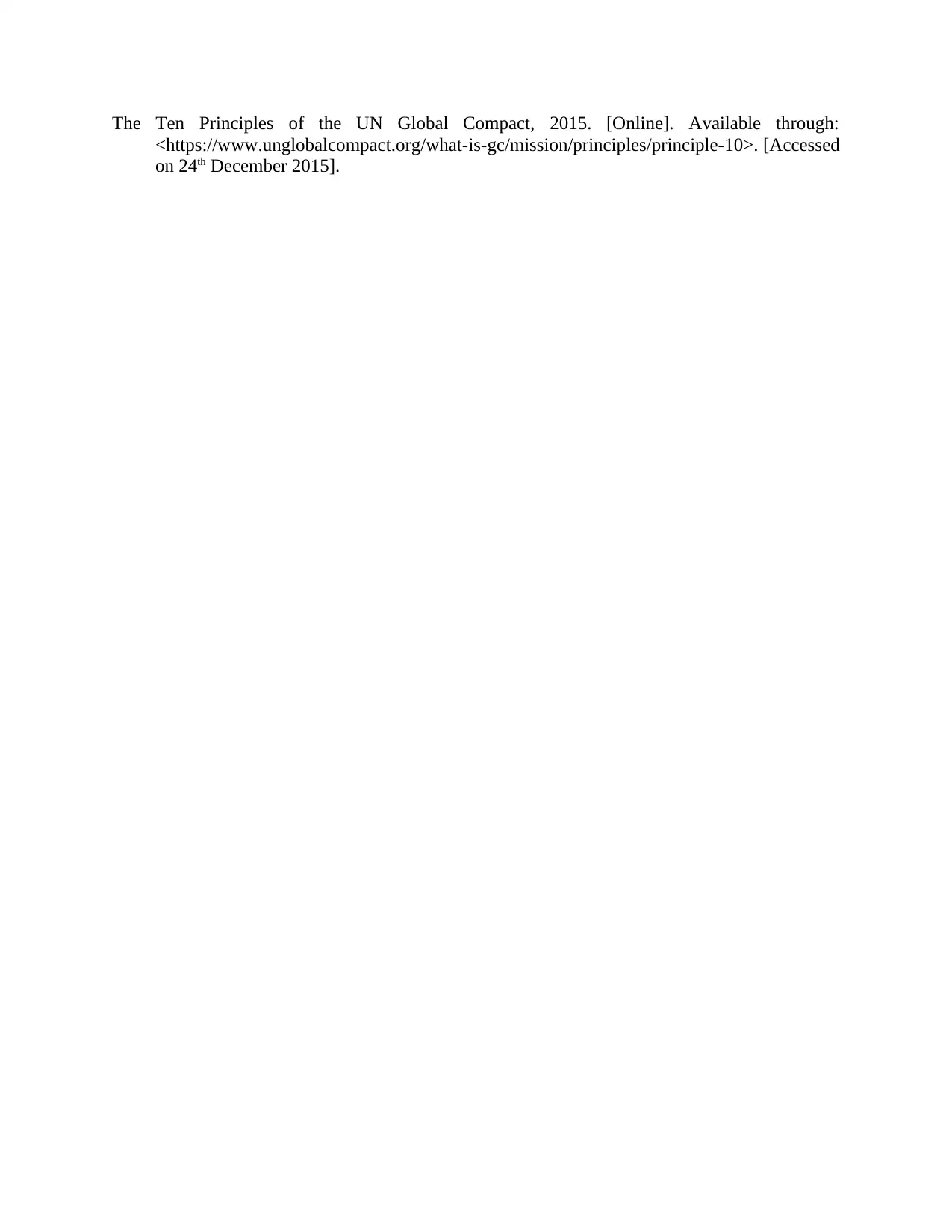
The Ten Principles of the UN Global Compact, 2015. [Online]. Available through:
<https://www.unglobalcompact.org/what-is-gc/mission/principles/principle-10>. [Accessed
on 24th December 2015].
<https://www.unglobalcompact.org/what-is-gc/mission/principles/principle-10>. [Accessed
on 24th December 2015].
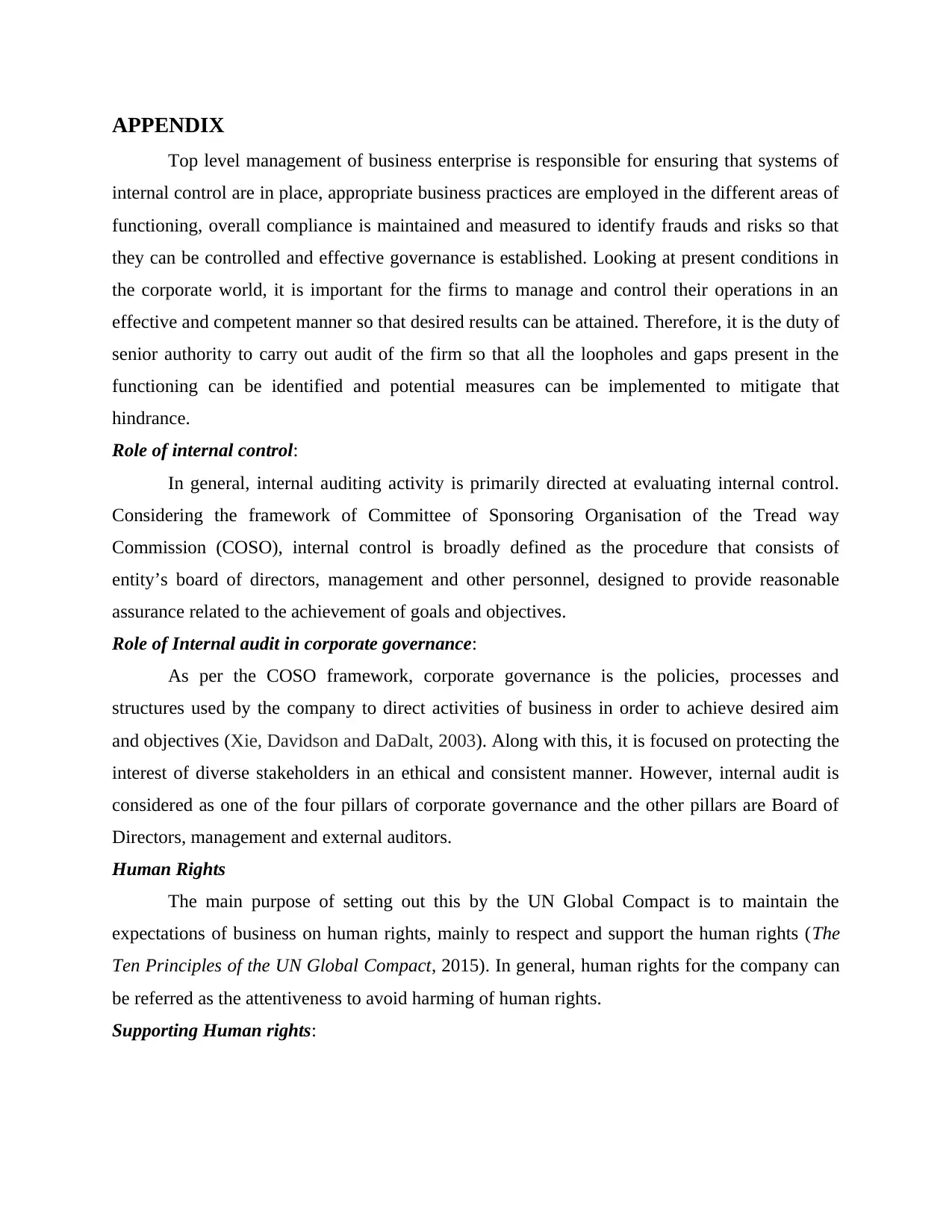
APPENDIX
Top level management of business enterprise is responsible for ensuring that systems of
internal control are in place, appropriate business practices are employed in the different areas of
functioning, overall compliance is maintained and measured to identify frauds and risks so that
they can be controlled and effective governance is established. Looking at present conditions in
the corporate world, it is important for the firms to manage and control their operations in an
effective and competent manner so that desired results can be attained. Therefore, it is the duty of
senior authority to carry out audit of the firm so that all the loopholes and gaps present in the
functioning can be identified and potential measures can be implemented to mitigate that
hindrance.
Role of internal control:
In general, internal auditing activity is primarily directed at evaluating internal control.
Considering the framework of Committee of Sponsoring Organisation of the Tread way
Commission (COSO), internal control is broadly defined as the procedure that consists of
entity’s board of directors, management and other personnel, designed to provide reasonable
assurance related to the achievement of goals and objectives.
Role of Internal audit in corporate governance:
As per the COSO framework, corporate governance is the policies, processes and
structures used by the company to direct activities of business in order to achieve desired aim
and objectives (Xie, Davidson and DaDalt, 2003). Along with this, it is focused on protecting the
interest of diverse stakeholders in an ethical and consistent manner. However, internal audit is
considered as one of the four pillars of corporate governance and the other pillars are Board of
Directors, management and external auditors.
Human Rights
The main purpose of setting out this by the UN Global Compact is to maintain the
expectations of business on human rights, mainly to respect and support the human rights (The
Ten Principles of the UN Global Compact, 2015). In general, human rights for the company can
be referred as the attentiveness to avoid harming of human rights.
Supporting Human rights:
Top level management of business enterprise is responsible for ensuring that systems of
internal control are in place, appropriate business practices are employed in the different areas of
functioning, overall compliance is maintained and measured to identify frauds and risks so that
they can be controlled and effective governance is established. Looking at present conditions in
the corporate world, it is important for the firms to manage and control their operations in an
effective and competent manner so that desired results can be attained. Therefore, it is the duty of
senior authority to carry out audit of the firm so that all the loopholes and gaps present in the
functioning can be identified and potential measures can be implemented to mitigate that
hindrance.
Role of internal control:
In general, internal auditing activity is primarily directed at evaluating internal control.
Considering the framework of Committee of Sponsoring Organisation of the Tread way
Commission (COSO), internal control is broadly defined as the procedure that consists of
entity’s board of directors, management and other personnel, designed to provide reasonable
assurance related to the achievement of goals and objectives.
Role of Internal audit in corporate governance:
As per the COSO framework, corporate governance is the policies, processes and
structures used by the company to direct activities of business in order to achieve desired aim
and objectives (Xie, Davidson and DaDalt, 2003). Along with this, it is focused on protecting the
interest of diverse stakeholders in an ethical and consistent manner. However, internal audit is
considered as one of the four pillars of corporate governance and the other pillars are Board of
Directors, management and external auditors.
Human Rights
The main purpose of setting out this by the UN Global Compact is to maintain the
expectations of business on human rights, mainly to respect and support the human rights (The
Ten Principles of the UN Global Compact, 2015). In general, human rights for the company can
be referred as the attentiveness to avoid harming of human rights.
Supporting Human rights:
Paraphrase This Document
Need a fresh take? Get an instant paraphrase of this document with our AI Paraphraser
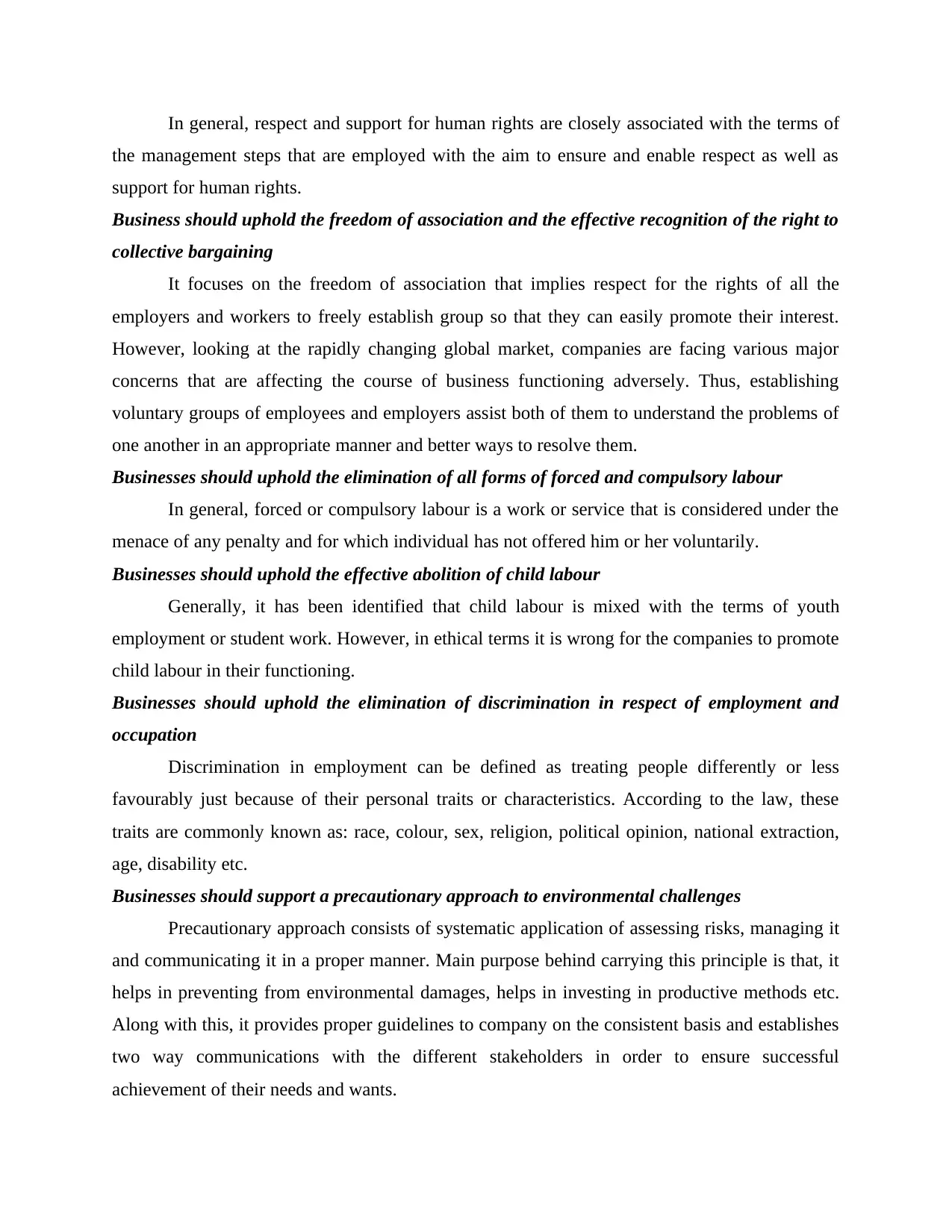
In general, respect and support for human rights are closely associated with the terms of
the management steps that are employed with the aim to ensure and enable respect as well as
support for human rights.
Business should uphold the freedom of association and the effective recognition of the right to
collective bargaining
It focuses on the freedom of association that implies respect for the rights of all the
employers and workers to freely establish group so that they can easily promote their interest.
However, looking at the rapidly changing global market, companies are facing various major
concerns that are affecting the course of business functioning adversely. Thus, establishing
voluntary groups of employees and employers assist both of them to understand the problems of
one another in an appropriate manner and better ways to resolve them.
Businesses should uphold the elimination of all forms of forced and compulsory labour
In general, forced or compulsory labour is a work or service that is considered under the
menace of any penalty and for which individual has not offered him or her voluntarily.
Businesses should uphold the effective abolition of child labour
Generally, it has been identified that child labour is mixed with the terms of youth
employment or student work. However, in ethical terms it is wrong for the companies to promote
child labour in their functioning.
Businesses should uphold the elimination of discrimination in respect of employment and
occupation
Discrimination in employment can be defined as treating people differently or less
favourably just because of their personal traits or characteristics. According to the law, these
traits are commonly known as: race, colour, sex, religion, political opinion, national extraction,
age, disability etc.
Businesses should support a precautionary approach to environmental challenges
Precautionary approach consists of systematic application of assessing risks, managing it
and communicating it in a proper manner. Main purpose behind carrying this principle is that, it
helps in preventing from environmental damages, helps in investing in productive methods etc.
Along with this, it provides proper guidelines to company on the consistent basis and establishes
two way communications with the different stakeholders in order to ensure successful
achievement of their needs and wants.
the management steps that are employed with the aim to ensure and enable respect as well as
support for human rights.
Business should uphold the freedom of association and the effective recognition of the right to
collective bargaining
It focuses on the freedom of association that implies respect for the rights of all the
employers and workers to freely establish group so that they can easily promote their interest.
However, looking at the rapidly changing global market, companies are facing various major
concerns that are affecting the course of business functioning adversely. Thus, establishing
voluntary groups of employees and employers assist both of them to understand the problems of
one another in an appropriate manner and better ways to resolve them.
Businesses should uphold the elimination of all forms of forced and compulsory labour
In general, forced or compulsory labour is a work or service that is considered under the
menace of any penalty and for which individual has not offered him or her voluntarily.
Businesses should uphold the effective abolition of child labour
Generally, it has been identified that child labour is mixed with the terms of youth
employment or student work. However, in ethical terms it is wrong for the companies to promote
child labour in their functioning.
Businesses should uphold the elimination of discrimination in respect of employment and
occupation
Discrimination in employment can be defined as treating people differently or less
favourably just because of their personal traits or characteristics. According to the law, these
traits are commonly known as: race, colour, sex, religion, political opinion, national extraction,
age, disability etc.
Businesses should support a precautionary approach to environmental challenges
Precautionary approach consists of systematic application of assessing risks, managing it
and communicating it in a proper manner. Main purpose behind carrying this principle is that, it
helps in preventing from environmental damages, helps in investing in productive methods etc.
Along with this, it provides proper guidelines to company on the consistent basis and establishes
two way communications with the different stakeholders in order to ensure successful
achievement of their needs and wants.

1 out of 15
Related Documents
Your All-in-One AI-Powered Toolkit for Academic Success.
+13062052269
info@desklib.com
Available 24*7 on WhatsApp / Email
![[object Object]](/_next/static/media/star-bottom.7253800d.svg)
Unlock your academic potential
© 2024 | Zucol Services PVT LTD | All rights reserved.





